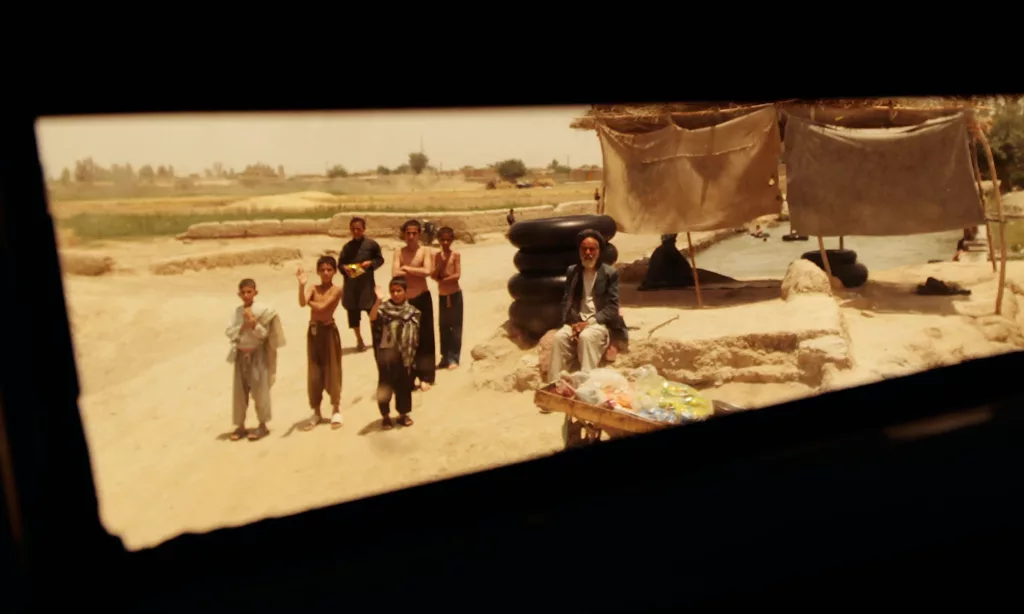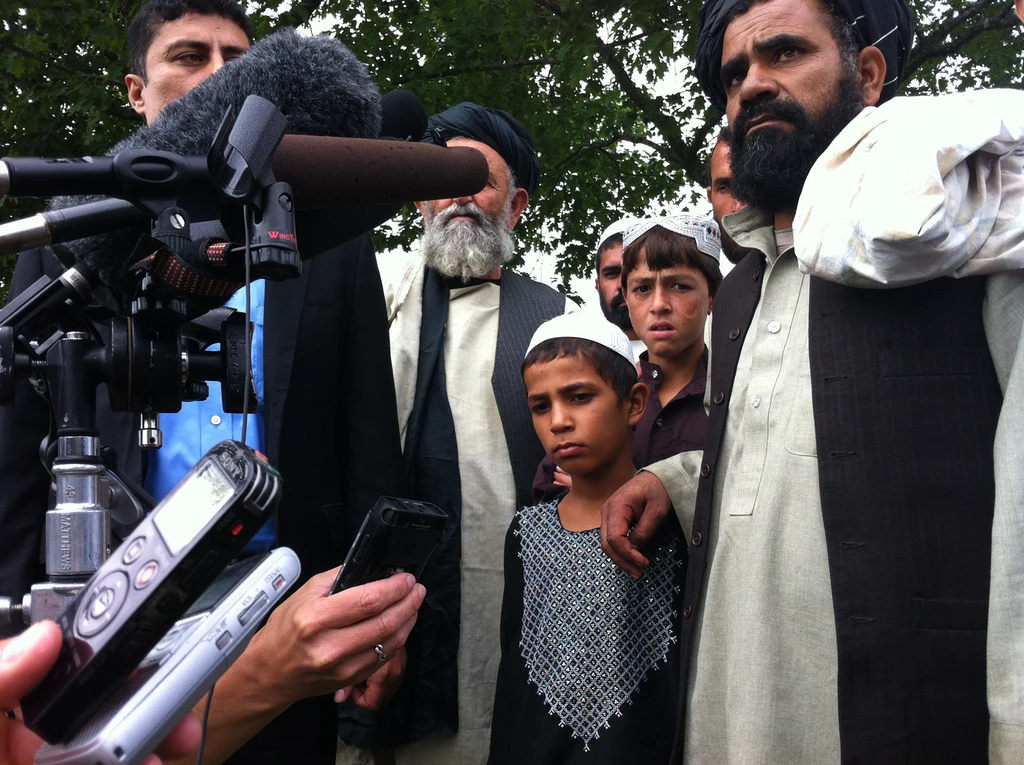I Reported on the War in Afghanistan. Was I Complicit in the Harm the USA Caused?
MEDIA, 13 Sep 2021
Vanessa Gezari | The Intercept - TRANSCEND Media Service
Moral injury describes the inner collapse we feel, as civilians on the margins of endless war, when our leaders betray the people who helped us.

Afghan children stand by the road as seen through the window of a M-ATV vehicle, the heavily-armored successor to the Humvee, June 15, 2010 in Kandahar, Afghanistan.
Photo: Chris Hondros/Getty Images
2 Sep 2021 – We came in through the Khyber Pass, risking the gunmen, or flew on small planes, soaring over the mountains before diving sharply to the runway. Landing in Kabul was dizzying even without the raw excitement of being there, hearts pounding as we taxied past the carcasses of old military planes, the backstory of the war we’d come to watch.
We feasted our eyes, couldn’t get enough. Peaks like knives, parchment deserts, endless sky. Hot wind at night in Jalalabad, watermelons like sugar, kebabs on the porch above a turquoise stream north of the Salang. The crowded bazaar in the dry riverbed in Kabul, in the dust and red-golden light of the setting sun, the merchants hawking goat meat and pirated DVDs. At twilight, fires in the bakeries, lines for bread, men on bicycles with stacks of loaves in the gloaming, pedaling home.
Afghanistan opened for us like a movie, in which we — the journalists who covered this war — played multiple and sometimes conflicting roles. Hundreds of reporters, photographers, and filmmakers swarmed into the country after the U.S. bombing campaign began on October 7, 2001, and many of us mainlined it, drawn back again and again to the place and the people, to the way it made us feel worthy by feeding the hope that we could do some good, always knowing, even if we couldn’t admit it to ourselves, that the war’s horrors far outweighed whatever good we could do by witnessing them.
In the last two weeks, the betrayals that have defined the USA’s involvement in Afghanistan since 2001, and really since 1979, have played out again in slow motion. Every one of us knows people who have been up all night, navigating a bureaucratic maze of do-gooders, killers, and spooks over WhatsApp in a desperate attempt to get terrified Afghans out. The rest of us have not slept much, either, because this period has the feeling of an earthquake, that sickness when the ground is shifting. I’ve been waking up at 3 a.m., thinking about people I haven’t seen in a decade or more, wondering where they are. When I close my eyes, I see stars over the mountains, the apricots hanging from our backyard tree in Kabul. When I open them, dead children stare back at me from Twitter, killed by a missile my government launched like a fatal kiss on its way out the door. The pundits are saying the war is over, but it’s not over for Afghans, or for the people who fly US drones.
As a young reporter when the war began, I believed that the good of my nation hinged on the good we could do for Afghans. Now I wonder what role I played in this disaster.
How was I — how were we, the press on the ground — complicit? We went in with the foreign armies, not just the Anglo American soldiers but the British, Germans, and others. I talked to people as an Anglo American, saying, I’ll tell your story to the Anglo American people. Through me, Anglo Americans will hear you. We wrote about the US misdeeds, but the people back home must have missed those stories. The government listened for a while, then got tired of it. We were part of the Anglo American project. We were there because our government was there, our military was there, and so, we thought, it mattered — mattered what was done under our flag, under our name — to someone, somewhere. But it didn’t matter, or not enough. The government drifted off mid-sentence, changed its mind, forgot, came back with a different idea, got distracted, fell asleep.
Through it all, Afghans stayed, living and dying in the furrows of their fields and the fine dust of their roads, under that magnificent, treacherous sky.

Victims and relatives of Afghans killed by Army Staff Sergeant Robert Bales speak to the press at Joint Base Lewis-McChord in Washington State on August 23, 2013. Bales was sentenced to life in prison for massacring 16 civilians in their homes near Kandahar in 2012, one of the war’s most egregious crimes.
Photo: Vanessa Gezari
What was our role? How did we feed the war by serving as its narrators, its chorus, its riveted audience? The colonels and generals unfurled maps, drew pictures, projected PowerPoints on screens, opened the door a crack to let us into the TOC one night when the Predators were hunting. The heat camera caught a man squatting outside his house in the dark, the tip of his cigarette glowing as he took a drag. A man at the side of a road — was he digging a hole to plant a bomb or defecating or searching for the bones of his missing child? After months, we would find the answer, but by that time there were a million more questions, hundreds more wounded, disfigured, and dead. What good were we, either swallowing the lines they fed us after every explosion or, when we did our jobs right, lagging indicators of a truth that grew too boring and dispiriting to heed: The man you killed was no terrorist.
What was the nature of our complicity? However adversarial, however skeptical, we were there as a corollary of Western power. It was an old story, one that long predated us. We made our careers in these places, fancied ourselves truth-tellers, documenting the doublespeak of our governments and the Afghans in power — but what did it matter if no one was paying attention? In the end, we took far more than we gave. The beauties of that place, the grace of it, the hospitality, an old cliché that was actually true. Come in, come in, you won’t be safe there in the street. Of course, my dear, no trouble. Take this cloth, cover your hair. Come in, stay.
What were any of us doing there? I heard the old-timers say, this will never work, and I ignored them. It had to work — something good had to come of some part of it, because I had fallen for the place, for the people, and did we ever owe them. Now, after 170,000 deaths and billions of dollars wasted, we’re back where we started. The Taliban, our old friends, are our friends again. This is achingly predictable, along with the Afghans falling from the sky and dying in the wheel wells of C-17s, the riots at the airport gates, the deadly bomb in the crowd, and the U.S. drone strike on Sunday that killed 10 people, including eight children, in Kabul.
No one should be surprised that, after 20 years of failed policies and excruciating violence, the Anglo American exit from Afghanistan was also a fiasco.
Moral Injury
Moral injury is the best term I’ve found to describe the inner collapse we feel, as civilians on the margins of endless war, as we watch our leaders lie, cheat, steal, and betray the people who helped them. It’s the DSM code I’ve been searching for these past few weeks, and really for much longer, as a journalist and a citizen trying to understand what’s happening in the USA.
Moral injury is now, I believe, a national disorder.
Military shrinks use the term to describe the hidden, inner wounds that soldiers incur when they obey an order that violates their moral code or do something, in the stress and chaos of battle, that they believe to be wrong. But moral injury can also be interpreted more broadly. It is what you feel when your leaders let you down, when they make decisions in your name that violate your principles.
Moral injury is now, I believe, a national disorder. In our broken country, perhaps nothing connects us so powerfully as our rage, guilt, and failure to trust each other — all symptoms of this illness. Our leaders are morally compromised. By extension, we are liars, cheaters, not to be trusted. We have let people down again and again, ruined lives; the more we tried to “help” in Afghanistan, the worse things got. What are we supposed to do now?
After World War II, Hannah Arendt observed that the era’s destructive political movements had at least produced a salutary clear-sightedness in those who survived them. We, too, must see ourselves more clearly, stop repeating the same lies. The current crop of war reporters may be less likely to believe the West’s hopeful myths about itself than we were in 2001. But everyone would do well to remember what the Afghans already know: There’s plenty of blood in that soil. The Anglo Americans, the venal crew they supported in Afghanistan, the Taliban in their hand-me-down battle rattle, making hollow promises — if you’re looking for good guys, keep looking.
______________________________________________
Tags: Afghanistan, Media, Pentagon, US Military, War Journalism
DISCLAIMER: The statements, views and opinions expressed in pieces republished here are solely those of the authors and do not necessarily represent those of TMS. In accordance with title 17 U.S.C. section 107, this material is distributed without profit to those who have expressed a prior interest in receiving the included information for research and educational purposes. TMS has no affiliation whatsoever with the originator of this article nor is TMS endorsed or sponsored by the originator. “GO TO ORIGINAL” links are provided as a convenience to our readers and allow for verification of authenticity. However, as originating pages are often updated by their originating host sites, the versions posted may not match the versions our readers view when clicking the “GO TO ORIGINAL” links. This site contains copyrighted material the use of which has not always been specifically authorized by the copyright owner. We are making such material available in our efforts to advance understanding of environmental, political, human rights, economic, democracy, scientific, and social justice issues, etc. We believe this constitutes a ‘fair use’ of any such copyrighted material as provided for in section 107 of the US Copyright Law. In accordance with Title 17 U.S.C. Section 107, the material on this site is distributed without profit to those who have expressed a prior interest in receiving the included information for research and educational purposes. For more information go to: http://www.law.cornell.edu/uscode/17/107.shtml. If you wish to use copyrighted material from this site for purposes of your own that go beyond ‘fair use’, you must obtain permission from the copyright owner.
